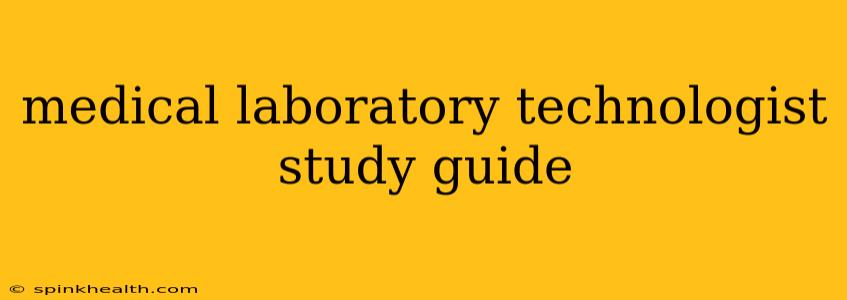The journey to becoming a medical laboratory technologist is challenging but incredibly rewarding. This comprehensive study guide will navigate you through the key areas you need to master, offering insights and strategies to help you succeed in your studies and beyond. This isn't just a list of facts; it's a roadmap to a fulfilling career dedicated to improving healthcare.
Imagine this: you're holding a sample, a tiny window into a patient's health. Your careful analysis, your precision, your knowledge – all contribute to a diagnosis, a treatment plan, a life changed. That's the power of a medical laboratory technologist. This guide will help you harness that power.
What are the main subjects I need to focus on to become a medical laboratory technologist?
This is a crucial question, and the answer varies slightly depending on your specific program. However, core subjects universally included in medical laboratory technology programs typically include:
-
Hematology: This encompasses the study of blood, its components, and related diseases. You’ll learn about blood cell morphology, coagulation, and various hematological tests, from the basics of complete blood counts (CBCs) to advanced techniques like flow cytometry. Think of it as detective work at a microscopic level.
-
Clinical Chemistry: Here, you'll delve into the chemical analysis of body fluids, like blood and urine. Understanding biochemical processes and metabolic pathways is critical for interpreting results and identifying potential health issues. This involves mastering analytical techniques and understanding the intricate relationship between lab results and patient health.
-
Microbiology: This involves the identification and characterization of microorganisms, including bacteria, viruses, fungi, and parasites. You’ll learn about sterilization techniques, culture methods, and antibiotic susceptibility testing. It's about understanding the invisible world that plays such a significant role in human health.
-
Immunology and Serology: This section delves into the body's immune system and the use of serological tests to diagnose infectious diseases and other conditions. Think antibody-antigen reactions and the complexities of the immune response – a fascinating field with life-saving applications.
-
Blood Banking (Immunohematology): This crucial area focuses on the safe and effective transfusion of blood and blood components. You’ll learn about blood group systems, compatibility testing, and the procedures involved in ensuring the proper matching of blood donors and recipients. This is a field where precision is paramount.
-
Urinalysis: While seemingly straightforward, urinalysis is a powerful diagnostic tool. You will learn to analyze urine samples, identifying abnormalities that can indicate kidney disease, urinary tract infections, and other conditions.
-
Laboratory Safety and Quality Control: This is not just an important section, it's fundamental. You will learn about proper laboratory techniques, safety regulations, quality assurance, and quality control practices to ensure accurate and reliable results. This area prioritizes patient safety and ensures the integrity of your work.
What kind of equipment and instruments will I use as a medical laboratory technologist?
The equipment used in medical laboratories is sophisticated and constantly evolving. Expect to become proficient with:
- Microscopes: Various types, from basic compound microscopes to advanced fluorescence microscopes, are essential for examining specimens.
- Automated Analyzers: These machines perform many tests quickly and accurately, significantly increasing efficiency.
- Centrifuges: Used to separate components of blood and other fluids.
- Spectrophotometers: Measure the absorbance or transmission of light, which is essential in many clinical chemistry assays.
- Automated Hematology Analyzers: Perform comprehensive blood counts and other hematological tests.
- Incubators: Maintain optimal temperature and humidity for microbial growth.
- Pipettes and other Volumetric Equipment: Accurate measurement of liquids is crucial in all aspects of laboratory work.
What are the career prospects for medical laboratory technologists?
The job market for skilled medical laboratory technologists is robust and consistently shows strong demand. Hospitals, clinics, diagnostic laboratories, and research institutions all rely on qualified professionals to perform the tests vital to patient care. Furthermore, the field offers opportunities for specialization and career advancement.
How can I prepare for the national certification exam?
National certification exams vary by country but require a strong grasp of the fundamental principles and techniques covered in your program. Consistent study, using a variety of resources like textbooks, practice questions, and online resources, is critical. Joining study groups can provide valuable peer support and enhance understanding through collaborative learning. Practice makes perfect; consistent engagement with practice questions will greatly improve your performance on exam day.
This study guide offers a solid foundation for your journey. Remember, the work you do as a medical laboratory technologist is essential; your dedication to accuracy and precision directly impacts patient care. Embrace the challenges, celebrate the successes, and enjoy the rewarding career that awaits you.

